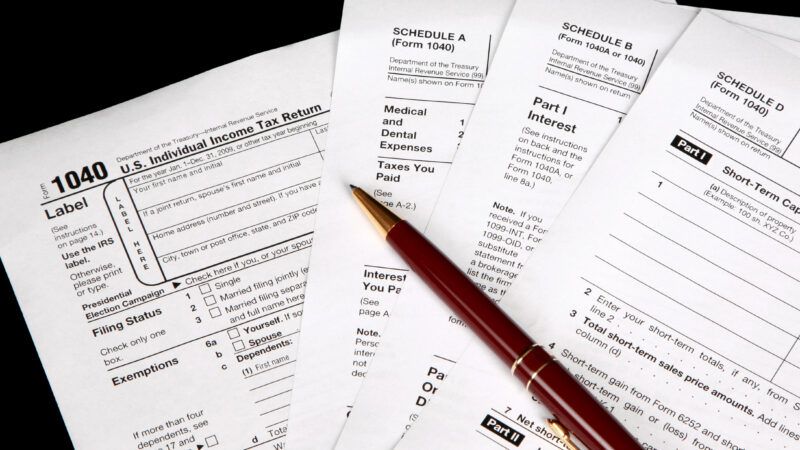Byzantine Tax Laws Threaten To Make Us All Tax Cheats
The Department of Justice is suing several tax preparers for filing fraudulent returns, but even honest filers risk running afoul of tax laws.

Each year, Americans prepare for tax season by scrounging up any spare receipt that might qualify them for a marginal credit or deduction. Sometimes people misrepresent their actual tax obligations in order to qualify for a lower tax bill or a higher refund. They might do this either accidentally or on purpose—but due to the complexity of the tax code the difference between the two can be quite murky.
This month the Department of Justice has announced law enforcement actions in at least six different cases involving tax preparers.
One case is a civil complaint against six people working for the Michigan tax-prep company Equitax. The complaint alleges that the defendants "knowingly took unreasonable or incorrect positions on tax returns they prepared" in order to artificially lower customers' tax obligations, resulting in a "significant loss in tax revenue, estimated at over $2 million for the 2021 tax year alone."
In another case, prosecutors allege that the operator of a Houston business called Taxes R Us "knowingly underreported the tax her customers owed," generating refunds that were collectively inflated by $1 million or more. And a judge just sentenced a Mississippi man to more than five years in prison after a jury found that he, along with others, cost the IRS over $3.5 million in lost tax revenue "by reporting false education credits, itemized deductions and business profits or losses on their clients' tax returns."
These cases join several more, including a Florida woman who allegedly deprived the government of more than $6 million since 2021 by understating her clients' tax liabilities, a Chicago man accused of inflating customers' refunds by reporting business losses that did not occur, and a Dallas woman found to have fraudulently secured her clients over $3 million in refunds.
Prosecutors bring charges in cases like these on the basis that the defendants' actions cause collective harm. "Those who prepare and file fraudulent returns cheat all honest taxpayers," said U.S. Attorney Erek Barron after a Maryland man was sentenced to more than two years in federal prison for filing fraudulent returns, resulting in over $325,000 in erroneous refunds.
But the complexity of the American tax code is what allows shady tax preparers to operate in the first place—and that same complexity poses a risk to the rest of us as well.
"If you look at the average IRS form, I mean, it looks like advanced calculus," says Patrick Hedger, executive director of the Taxpayers Protection Alliance. "These forms aren't clear," he says. "That created the need for private sector companies to fill the gap and help people prepare their taxes….And even the people that are doing it professionally are making mistakes."
It's quite possible that each of the defendants mentioned above did knowingly misrepresent clients' tax obligations, in violation of federal law. But even with the best of intentions, tax preparers—and taxpayers filing their own returns—risk running afoul of the overly complex tax code or the IRS's rules.
"When Congress creates carve-outs, it generally tasks the IRS with defining what qualifies," Hedger tells Reason. "And so the IRS, through rule changes and regulatory guidance, can have a lot of discretion in terms of deciding what qualifies or what doesn't, for various deductions and credits. There is a difference between what the law may sound like and what the IRS decides does or does not qualify."
This disconnect exists even within the IRS itself: In 1989, the IRS admitted that when filers called with questions, the agency gave wrong answers more than 30 percent of the time. In the time since, the tax code has only gotten more complicated—the Government Accountability Office (GAO) found that during the 2021 tax filing season, the IRS "suspended and reviewed 35 million returns with errors." This could be the result of mistakes by filers, but it could also be the result of mistakes made by IRS agents. The GAO noted that the IRS "does not have a process to identify and analyze their underlying causes."
Such a voluminous system of tax laws, with byzantine reporting requirements, allows cheats to use that complexity to their advantage. In each case listed above, fraudulent tax preparers allegedly claimed deductions and credits their clients did not qualify for.
That same complexity can make it nearly impossible for the average taxpayer to safely and confidently file a return without enlisting the help of outside experts, at significant overall expense: Taxpayers spend more than $100 billion per year in out-of-pocket expenses related to filing, as well as an estimated $260 billion per year in lost time spent complying with tax law, according to the National Taxpayers Union Foundation.
Each of the Justice Department's cases against tax preparers may be legally sound, and each defendant may have knowingly committed fraud. But the complexity of the tax code threatens to make tax cheats of us all.


Show Comments (56)